A Critical Analysis of the Australian Native Title Act
VerifiedAdded on 2022/12/19
|10
|3702
|1
Essay
AI Summary
This essay delves into the complexities of the Native Title Act 1993 in Australia, examining its impact on the land rights of Indigenous peoples. It begins by providing historical context, including the significance of the Mabo case and the legal framework established to recognize native title claims. The essay critically analyzes the act's effectiveness, exploring arguments that it prioritizes the rights of non-Indigenous Australians. It examines substantive and procedural aspects of the legislation, including the 2017 amendments, and discusses the limitations and potential extinguishment of native title. The essay also incorporates critical race theory to explain why the Native Title Act may have maintained the divide between Indigenous and non-Indigenous peoples. Furthermore, it examines the impact of the act on the Yorta Yorta community and highlights the role of racial discrimination within the legal system. The essay discusses the right to negotiate and the criteria for granting native title. It concludes by arguing that the legislative framework on property rights in Australia is prejudiced and in favor of the non-indigenous peoples.
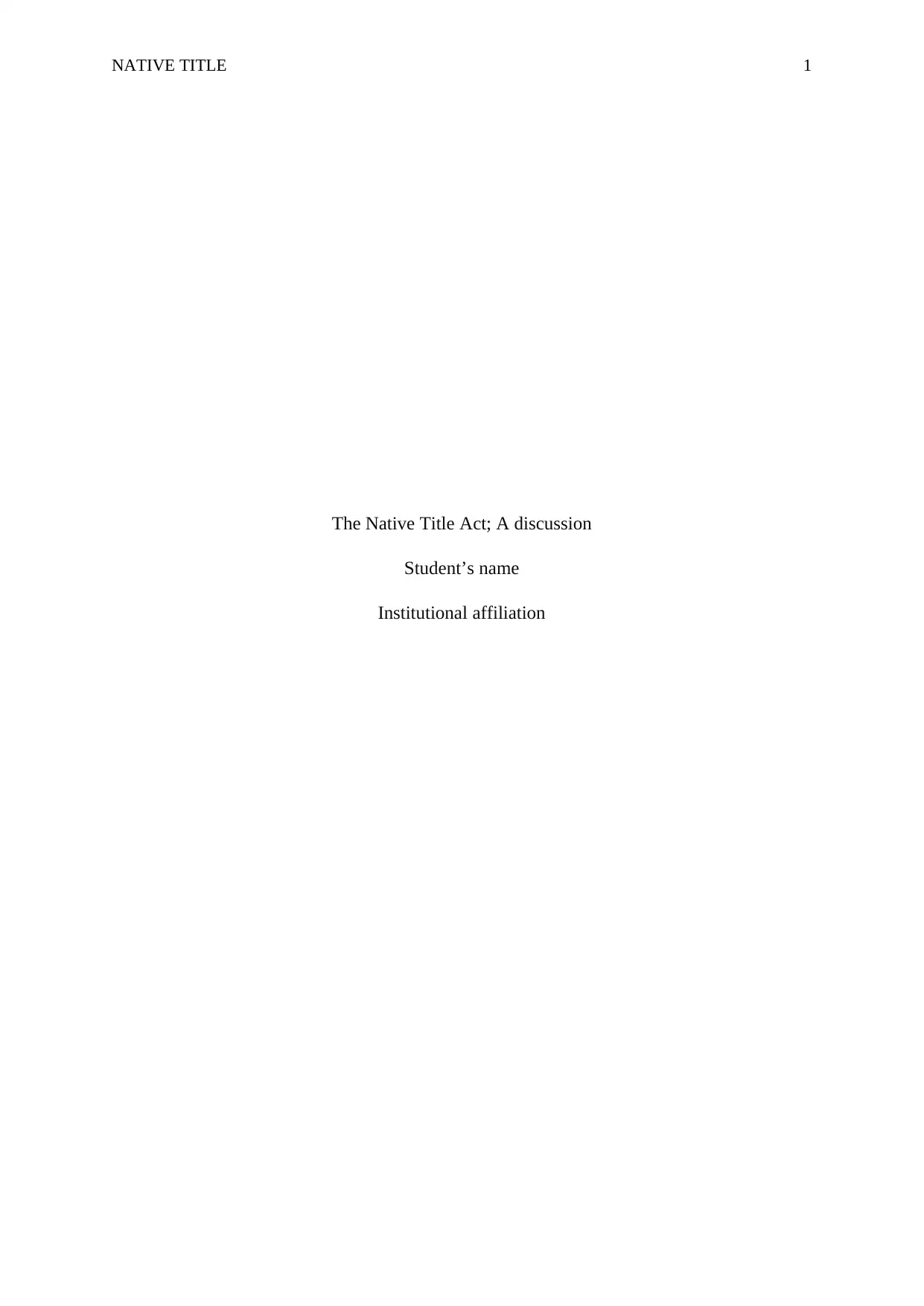
NATIVE TITLE 1
The Native Title Act; A discussion
Student’s name
Institutional affiliation
The Native Title Act; A discussion
Student’s name
Institutional affiliation
Paraphrase This Document
Need a fresh take? Get an instant paraphrase of this document with our AI Paraphraser
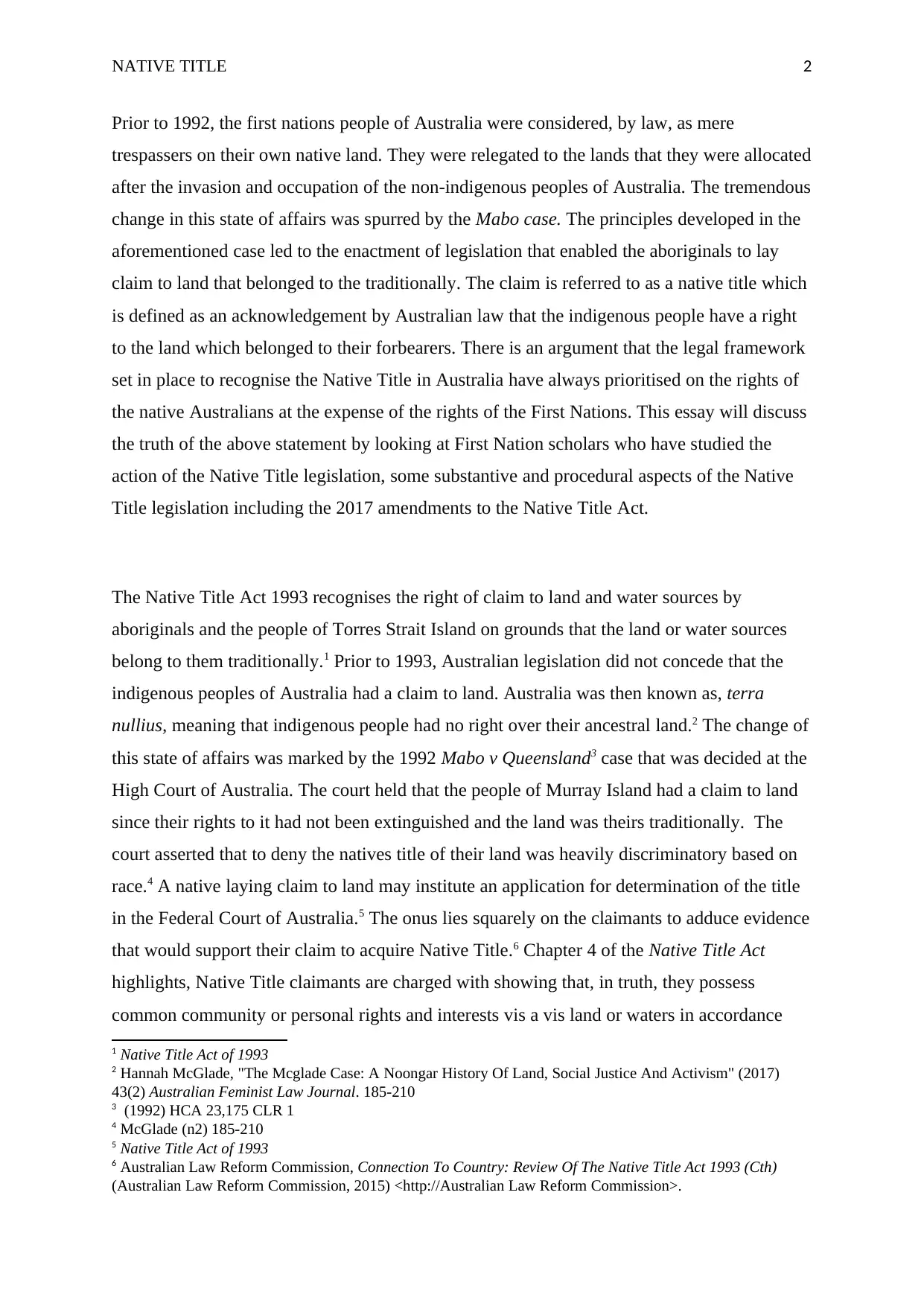
NATIVE TITLE 2
Prior to 1992, the first nations people of Australia were considered, by law, as mere
trespassers on their own native land. They were relegated to the lands that they were allocated
after the invasion and occupation of the non-indigenous peoples of Australia. The tremendous
change in this state of affairs was spurred by the Mabo case. The principles developed in the
aforementioned case led to the enactment of legislation that enabled the aboriginals to lay
claim to land that belonged to the traditionally. The claim is referred to as a native title which
is defined as an acknowledgement by Australian law that the indigenous people have a right
to the land which belonged to their forbearers. There is an argument that the legal framework
set in place to recognise the Native Title in Australia have always prioritised on the rights of
the native Australians at the expense of the rights of the First Nations. This essay will discuss
the truth of the above statement by looking at First Nation scholars who have studied the
action of the Native Title legislation, some substantive and procedural aspects of the Native
Title legislation including the 2017 amendments to the Native Title Act.
The Native Title Act 1993 recognises the right of claim to land and water sources by
aboriginals and the people of Torres Strait Island on grounds that the land or water sources
belong to them traditionally.1 Prior to 1993, Australian legislation did not concede that the
indigenous peoples of Australia had a claim to land. Australia was then known as, terra
nullius, meaning that indigenous people had no right over their ancestral land.2 The change of
this state of affairs was marked by the 1992 Mabo v Queensland3 case that was decided at the
High Court of Australia. The court held that the people of Murray Island had a claim to land
since their rights to it had not been extinguished and the land was theirs traditionally. The
court asserted that to deny the natives title of their land was heavily discriminatory based on
race.4 A native laying claim to land may institute an application for determination of the title
in the Federal Court of Australia.5 The onus lies squarely on the claimants to adduce evidence
that would support their claim to acquire Native Title.6 Chapter 4 of the Native Title Act
highlights, Native Title claimants are charged with showing that, in truth, they possess
common community or personal rights and interests vis a vis land or waters in accordance
1 Native Title Act of 1993
2 Hannah McGlade, "The Mcglade Case: A Noongar History Of Land, Social Justice And Activism" (2017)
43(2) Australian Feminist Law Journal. 185-210
3 (1992) HCA 23,175 CLR 1
4 McGlade (n2) 185-210
5 Native Title Act of 1993
6 Australian Law Reform Commission, Connection To Country: Review Of The Native Title Act 1993 (Cth)
(Australian Law Reform Commission, 2015) <http://Australian Law Reform Commission>.
Prior to 1992, the first nations people of Australia were considered, by law, as mere
trespassers on their own native land. They were relegated to the lands that they were allocated
after the invasion and occupation of the non-indigenous peoples of Australia. The tremendous
change in this state of affairs was spurred by the Mabo case. The principles developed in the
aforementioned case led to the enactment of legislation that enabled the aboriginals to lay
claim to land that belonged to the traditionally. The claim is referred to as a native title which
is defined as an acknowledgement by Australian law that the indigenous people have a right
to the land which belonged to their forbearers. There is an argument that the legal framework
set in place to recognise the Native Title in Australia have always prioritised on the rights of
the native Australians at the expense of the rights of the First Nations. This essay will discuss
the truth of the above statement by looking at First Nation scholars who have studied the
action of the Native Title legislation, some substantive and procedural aspects of the Native
Title legislation including the 2017 amendments to the Native Title Act.
The Native Title Act 1993 recognises the right of claim to land and water sources by
aboriginals and the people of Torres Strait Island on grounds that the land or water sources
belong to them traditionally.1 Prior to 1993, Australian legislation did not concede that the
indigenous peoples of Australia had a claim to land. Australia was then known as, terra
nullius, meaning that indigenous people had no right over their ancestral land.2 The change of
this state of affairs was marked by the 1992 Mabo v Queensland3 case that was decided at the
High Court of Australia. The court held that the people of Murray Island had a claim to land
since their rights to it had not been extinguished and the land was theirs traditionally. The
court asserted that to deny the natives title of their land was heavily discriminatory based on
race.4 A native laying claim to land may institute an application for determination of the title
in the Federal Court of Australia.5 The onus lies squarely on the claimants to adduce evidence
that would support their claim to acquire Native Title.6 Chapter 4 of the Native Title Act
highlights, Native Title claimants are charged with showing that, in truth, they possess
common community or personal rights and interests vis a vis land or waters in accordance
1 Native Title Act of 1993
2 Hannah McGlade, "The Mcglade Case: A Noongar History Of Land, Social Justice And Activism" (2017)
43(2) Australian Feminist Law Journal. 185-210
3 (1992) HCA 23,175 CLR 1
4 McGlade (n2) 185-210
5 Native Title Act of 1993
6 Australian Law Reform Commission, Connection To Country: Review Of The Native Title Act 1993 (Cth)
(Australian Law Reform Commission, 2015) <http://Australian Law Reform Commission>.
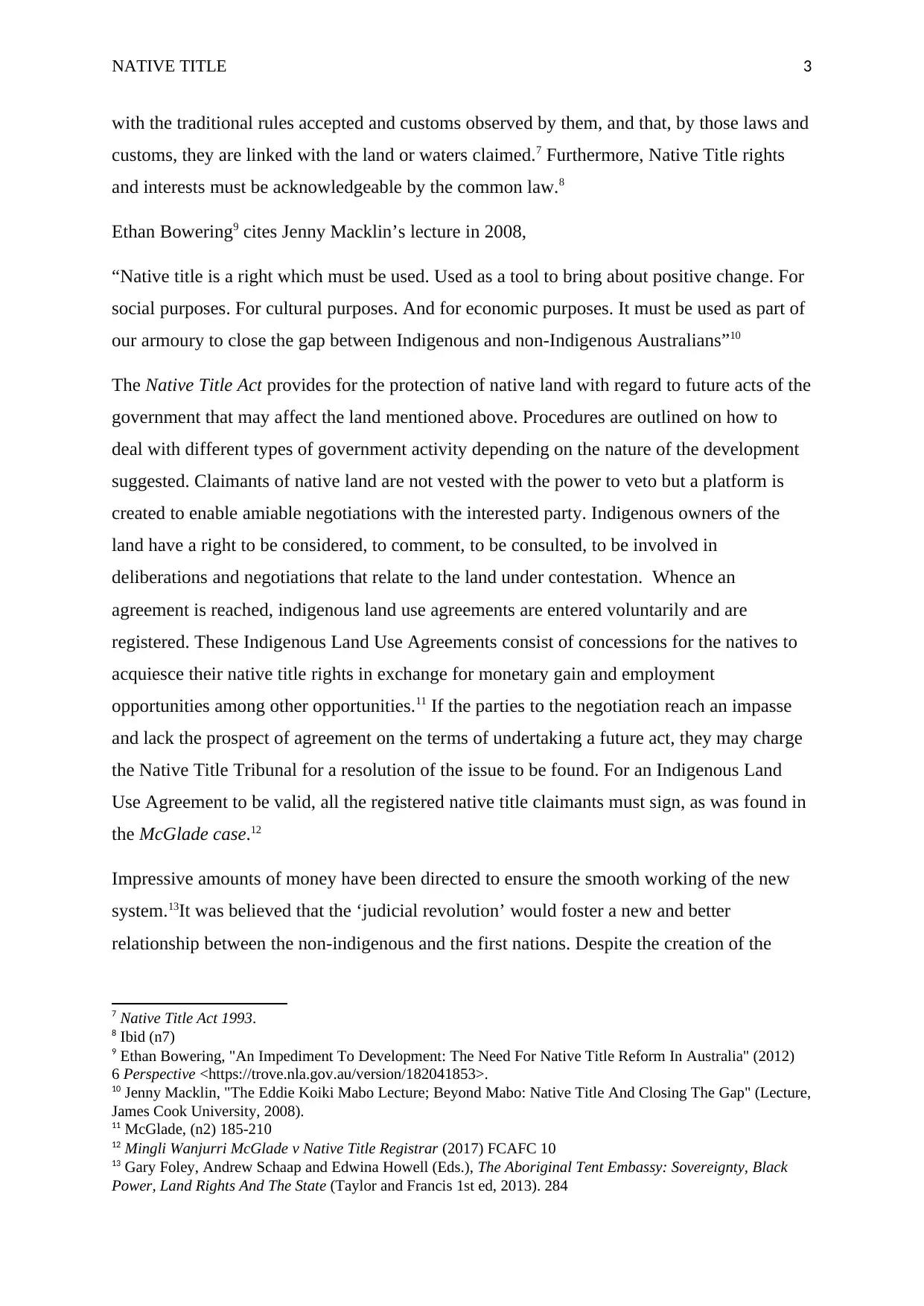
NATIVE TITLE 3
with the traditional rules accepted and customs observed by them, and that, by those laws and
customs, they are linked with the land or waters claimed.7 Furthermore, Native Title rights
and interests must be acknowledgeable by the common law.8
Ethan Bowering9 cites Jenny Macklin’s lecture in 2008,
“Native title is a right which must be used. Used as a tool to bring about positive change. For
social purposes. For cultural purposes. And for economic purposes. It must be used as part of
our armoury to close the gap between Indigenous and non-Indigenous Australians”10
The Native Title Act provides for the protection of native land with regard to future acts of the
government that may affect the land mentioned above. Procedures are outlined on how to
deal with different types of government activity depending on the nature of the development
suggested. Claimants of native land are not vested with the power to veto but a platform is
created to enable amiable negotiations with the interested party. Indigenous owners of the
land have a right to be considered, to comment, to be consulted, to be involved in
deliberations and negotiations that relate to the land under contestation. Whence an
agreement is reached, indigenous land use agreements are entered voluntarily and are
registered. These Indigenous Land Use Agreements consist of concessions for the natives to
acquiesce their native title rights in exchange for monetary gain and employment
opportunities among other opportunities.11 If the parties to the negotiation reach an impasse
and lack the prospect of agreement on the terms of undertaking a future act, they may charge
the Native Title Tribunal for a resolution of the issue to be found. For an Indigenous Land
Use Agreement to be valid, all the registered native title claimants must sign, as was found in
the McGlade case.12
Impressive amounts of money have been directed to ensure the smooth working of the new
system.13It was believed that the ‘judicial revolution’ would foster a new and better
relationship between the non-indigenous and the first nations. Despite the creation of the
7 Native Title Act 1993.
8 Ibid (n7)
9 Ethan Bowering, "An Impediment To Development: The Need For Native Title Reform In Australia" (2012)
6 Perspective <https://trove.nla.gov.au/version/182041853>.
10 Jenny Macklin, "The Eddie Koiki Mabo Lecture; Beyond Mabo: Native Title And Closing The Gap" (Lecture,
James Cook University, 2008).
11 McGlade, (n2) 185-210
12 Mingli Wanjurri McGlade v Native Title Registrar (2017) FCAFC 10
13 Gary Foley, Andrew Schaap and Edwina Howell (Eds.), The Aboriginal Tent Embassy: Sovereignty, Black
Power, Land Rights And The State (Taylor and Francis 1st ed, 2013). 284
with the traditional rules accepted and customs observed by them, and that, by those laws and
customs, they are linked with the land or waters claimed.7 Furthermore, Native Title rights
and interests must be acknowledgeable by the common law.8
Ethan Bowering9 cites Jenny Macklin’s lecture in 2008,
“Native title is a right which must be used. Used as a tool to bring about positive change. For
social purposes. For cultural purposes. And for economic purposes. It must be used as part of
our armoury to close the gap between Indigenous and non-Indigenous Australians”10
The Native Title Act provides for the protection of native land with regard to future acts of the
government that may affect the land mentioned above. Procedures are outlined on how to
deal with different types of government activity depending on the nature of the development
suggested. Claimants of native land are not vested with the power to veto but a platform is
created to enable amiable negotiations with the interested party. Indigenous owners of the
land have a right to be considered, to comment, to be consulted, to be involved in
deliberations and negotiations that relate to the land under contestation. Whence an
agreement is reached, indigenous land use agreements are entered voluntarily and are
registered. These Indigenous Land Use Agreements consist of concessions for the natives to
acquiesce their native title rights in exchange for monetary gain and employment
opportunities among other opportunities.11 If the parties to the negotiation reach an impasse
and lack the prospect of agreement on the terms of undertaking a future act, they may charge
the Native Title Tribunal for a resolution of the issue to be found. For an Indigenous Land
Use Agreement to be valid, all the registered native title claimants must sign, as was found in
the McGlade case.12
Impressive amounts of money have been directed to ensure the smooth working of the new
system.13It was believed that the ‘judicial revolution’ would foster a new and better
relationship between the non-indigenous and the first nations. Despite the creation of the
7 Native Title Act 1993.
8 Ibid (n7)
9 Ethan Bowering, "An Impediment To Development: The Need For Native Title Reform In Australia" (2012)
6 Perspective <https://trove.nla.gov.au/version/182041853>.
10 Jenny Macklin, "The Eddie Koiki Mabo Lecture; Beyond Mabo: Native Title And Closing The Gap" (Lecture,
James Cook University, 2008).
11 McGlade, (n2) 185-210
12 Mingli Wanjurri McGlade v Native Title Registrar (2017) FCAFC 10
13 Gary Foley, Andrew Schaap and Edwina Howell (Eds.), The Aboriginal Tent Embassy: Sovereignty, Black
Power, Land Rights And The State (Taylor and Francis 1st ed, 2013). 284
⊘ This is a preview!⊘
Do you want full access?
Subscribe today to unlock all pages.

Trusted by 1+ million students worldwide
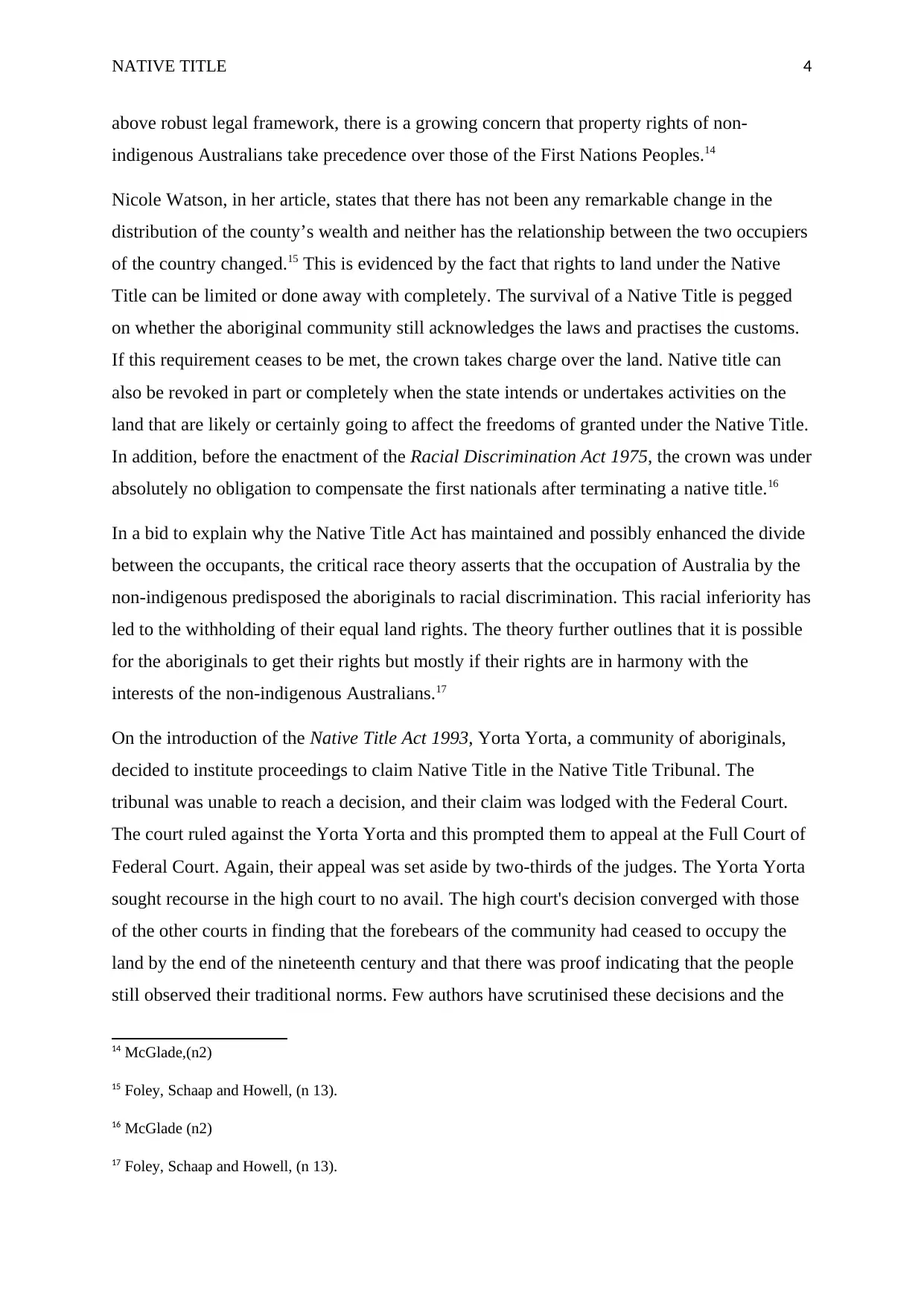
NATIVE TITLE 4
above robust legal framework, there is a growing concern that property rights of non-
indigenous Australians take precedence over those of the First Nations Peoples.14
Nicole Watson, in her article, states that there has not been any remarkable change in the
distribution of the county’s wealth and neither has the relationship between the two occupiers
of the country changed.15 This is evidenced by the fact that rights to land under the Native
Title can be limited or done away with completely. The survival of a Native Title is pegged
on whether the aboriginal community still acknowledges the laws and practises the customs.
If this requirement ceases to be met, the crown takes charge over the land. Native title can
also be revoked in part or completely when the state intends or undertakes activities on the
land that are likely or certainly going to affect the freedoms of granted under the Native Title.
In addition, before the enactment of the Racial Discrimination Act 1975, the crown was under
absolutely no obligation to compensate the first nationals after terminating a native title.16
In a bid to explain why the Native Title Act has maintained and possibly enhanced the divide
between the occupants, the critical race theory asserts that the occupation of Australia by the
non-indigenous predisposed the aboriginals to racial discrimination. This racial inferiority has
led to the withholding of their equal land rights. The theory further outlines that it is possible
for the aboriginals to get their rights but mostly if their rights are in harmony with the
interests of the non-indigenous Australians.17
On the introduction of the Native Title Act 1993, Yorta Yorta, a community of aboriginals,
decided to institute proceedings to claim Native Title in the Native Title Tribunal. The
tribunal was unable to reach a decision, and their claim was lodged with the Federal Court.
The court ruled against the Yorta Yorta and this prompted them to appeal at the Full Court of
Federal Court. Again, their appeal was set aside by two-thirds of the judges. The Yorta Yorta
sought recourse in the high court to no avail. The high court's decision converged with those
of the other courts in finding that the forebears of the community had ceased to occupy the
land by the end of the nineteenth century and that there was proof indicating that the people
still observed their traditional norms. Few authors have scrutinised these decisions and the
14 McGlade,(n2)
15 Foley, Schaap and Howell, (n 13).
16 McGlade (n2)
17 Foley, Schaap and Howell, (n 13).
above robust legal framework, there is a growing concern that property rights of non-
indigenous Australians take precedence over those of the First Nations Peoples.14
Nicole Watson, in her article, states that there has not been any remarkable change in the
distribution of the county’s wealth and neither has the relationship between the two occupiers
of the country changed.15 This is evidenced by the fact that rights to land under the Native
Title can be limited or done away with completely. The survival of a Native Title is pegged
on whether the aboriginal community still acknowledges the laws and practises the customs.
If this requirement ceases to be met, the crown takes charge over the land. Native title can
also be revoked in part or completely when the state intends or undertakes activities on the
land that are likely or certainly going to affect the freedoms of granted under the Native Title.
In addition, before the enactment of the Racial Discrimination Act 1975, the crown was under
absolutely no obligation to compensate the first nationals after terminating a native title.16
In a bid to explain why the Native Title Act has maintained and possibly enhanced the divide
between the occupants, the critical race theory asserts that the occupation of Australia by the
non-indigenous predisposed the aboriginals to racial discrimination. This racial inferiority has
led to the withholding of their equal land rights. The theory further outlines that it is possible
for the aboriginals to get their rights but mostly if their rights are in harmony with the
interests of the non-indigenous Australians.17
On the introduction of the Native Title Act 1993, Yorta Yorta, a community of aboriginals,
decided to institute proceedings to claim Native Title in the Native Title Tribunal. The
tribunal was unable to reach a decision, and their claim was lodged with the Federal Court.
The court ruled against the Yorta Yorta and this prompted them to appeal at the Full Court of
Federal Court. Again, their appeal was set aside by two-thirds of the judges. The Yorta Yorta
sought recourse in the high court to no avail. The high court's decision converged with those
of the other courts in finding that the forebears of the community had ceased to occupy the
land by the end of the nineteenth century and that there was proof indicating that the people
still observed their traditional norms. Few authors have scrutinised these decisions and the
14 McGlade,(n2)
15 Foley, Schaap and Howell, (n 13).
16 McGlade (n2)
17 Foley, Schaap and Howell, (n 13).
Paraphrase This Document
Need a fresh take? Get an instant paraphrase of this document with our AI Paraphraser
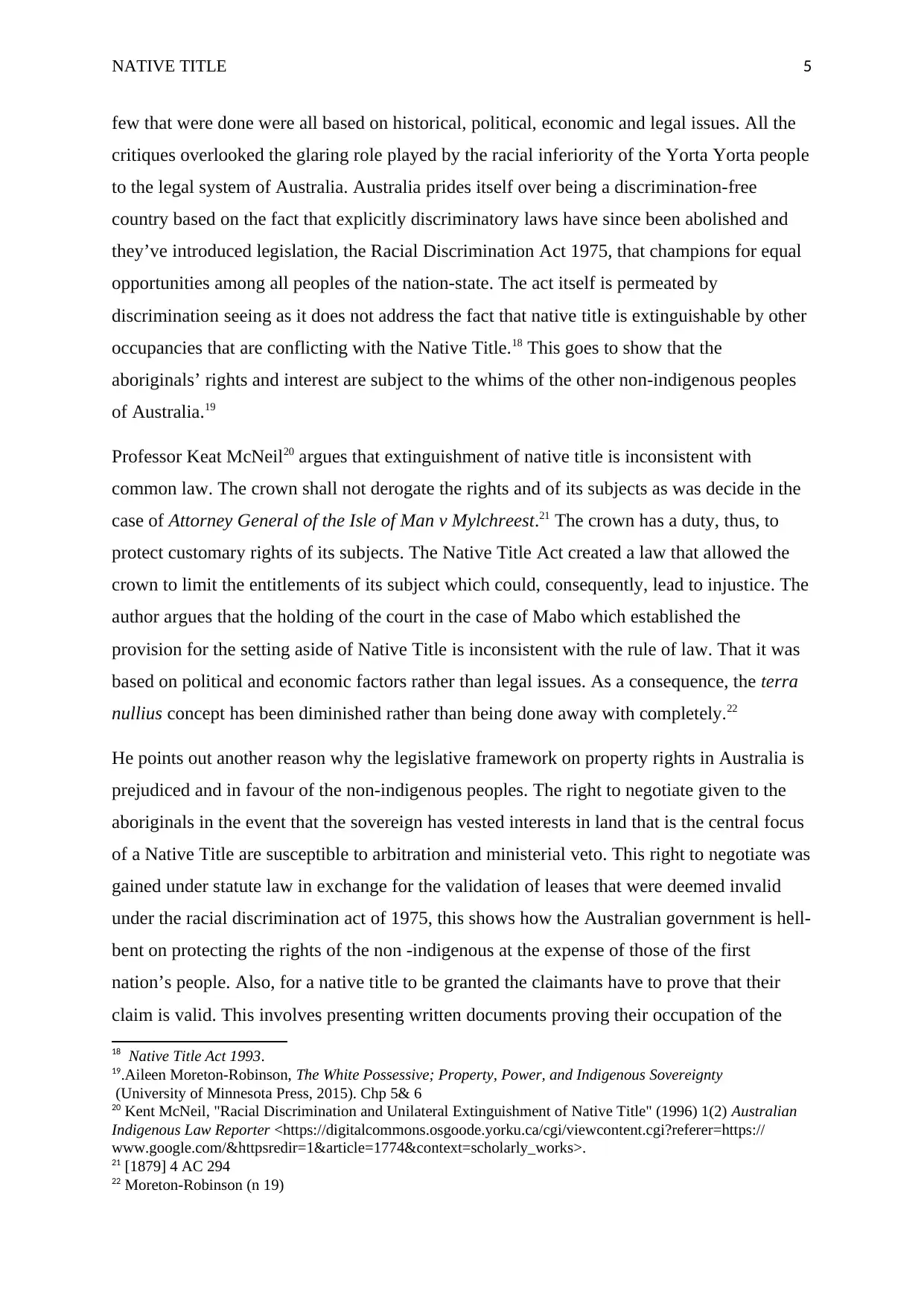
NATIVE TITLE 5
few that were done were all based on historical, political, economic and legal issues. All the
critiques overlooked the glaring role played by the racial inferiority of the Yorta Yorta people
to the legal system of Australia. Australia prides itself over being a discrimination-free
country based on the fact that explicitly discriminatory laws have since been abolished and
they’ve introduced legislation, the Racial Discrimination Act 1975, that champions for equal
opportunities among all peoples of the nation-state. The act itself is permeated by
discrimination seeing as it does not address the fact that native title is extinguishable by other
occupancies that are conflicting with the Native Title.18 This goes to show that the
aboriginals’ rights and interest are subject to the whims of the other non-indigenous peoples
of Australia.19
Professor Keat McNeil20 argues that extinguishment of native title is inconsistent with
common law. The crown shall not derogate the rights and of its subjects as was decide in the
case of Attorney General of the Isle of Man v Mylchreest.21 The crown has a duty, thus, to
protect customary rights of its subjects. The Native Title Act created a law that allowed the
crown to limit the entitlements of its subject which could, consequently, lead to injustice. The
author argues that the holding of the court in the case of Mabo which established the
provision for the setting aside of Native Title is inconsistent with the rule of law. That it was
based on political and economic factors rather than legal issues. As a consequence, the terra
nullius concept has been diminished rather than being done away with completely.22
He points out another reason why the legislative framework on property rights in Australia is
prejudiced and in favour of the non-indigenous peoples. The right to negotiate given to the
aboriginals in the event that the sovereign has vested interests in land that is the central focus
of a Native Title are susceptible to arbitration and ministerial veto. This right to negotiate was
gained under statute law in exchange for the validation of leases that were deemed invalid
under the racial discrimination act of 1975, this shows how the Australian government is hell-
bent on protecting the rights of the non -indigenous at the expense of those of the first
nation’s people. Also, for a native title to be granted the claimants have to prove that their
claim is valid. This involves presenting written documents proving their occupation of the
18 Native Title Act 1993.
19.Aileen Moreton-Robinson, The White Possessive; Property, Power, and Indigenous Sovereignty
(University of Minnesota Press, 2015). Chp 5& 6
20 Kent McNeil, "Racial Discrimination and Unilateral Extinguishment of Native Title" (1996) 1(2) Australian
Indigenous Law Reporter <https://digitalcommons.osgoode.yorku.ca/cgi/viewcontent.cgi?referer=https://
www.google.com/&httpsredir=1&article=1774&context=scholarly_works>.
21 [1879] 4 AC 294
22 Moreton-Robinson (n 19)
few that were done were all based on historical, political, economic and legal issues. All the
critiques overlooked the glaring role played by the racial inferiority of the Yorta Yorta people
to the legal system of Australia. Australia prides itself over being a discrimination-free
country based on the fact that explicitly discriminatory laws have since been abolished and
they’ve introduced legislation, the Racial Discrimination Act 1975, that champions for equal
opportunities among all peoples of the nation-state. The act itself is permeated by
discrimination seeing as it does not address the fact that native title is extinguishable by other
occupancies that are conflicting with the Native Title.18 This goes to show that the
aboriginals’ rights and interest are subject to the whims of the other non-indigenous peoples
of Australia.19
Professor Keat McNeil20 argues that extinguishment of native title is inconsistent with
common law. The crown shall not derogate the rights and of its subjects as was decide in the
case of Attorney General of the Isle of Man v Mylchreest.21 The crown has a duty, thus, to
protect customary rights of its subjects. The Native Title Act created a law that allowed the
crown to limit the entitlements of its subject which could, consequently, lead to injustice. The
author argues that the holding of the court in the case of Mabo which established the
provision for the setting aside of Native Title is inconsistent with the rule of law. That it was
based on political and economic factors rather than legal issues. As a consequence, the terra
nullius concept has been diminished rather than being done away with completely.22
He points out another reason why the legislative framework on property rights in Australia is
prejudiced and in favour of the non-indigenous peoples. The right to negotiate given to the
aboriginals in the event that the sovereign has vested interests in land that is the central focus
of a Native Title are susceptible to arbitration and ministerial veto. This right to negotiate was
gained under statute law in exchange for the validation of leases that were deemed invalid
under the racial discrimination act of 1975, this shows how the Australian government is hell-
bent on protecting the rights of the non -indigenous at the expense of those of the first
nation’s people. Also, for a native title to be granted the claimants have to prove that their
claim is valid. This involves presenting written documents proving their occupation of the
18 Native Title Act 1993.
19.Aileen Moreton-Robinson, The White Possessive; Property, Power, and Indigenous Sovereignty
(University of Minnesota Press, 2015). Chp 5& 6
20 Kent McNeil, "Racial Discrimination and Unilateral Extinguishment of Native Title" (1996) 1(2) Australian
Indigenous Law Reporter <https://digitalcommons.osgoode.yorku.ca/cgi/viewcontent.cgi?referer=https://
www.google.com/&httpsredir=1&article=1774&context=scholarly_works>.
21 [1879] 4 AC 294
22 Moreton-Robinson (n 19)
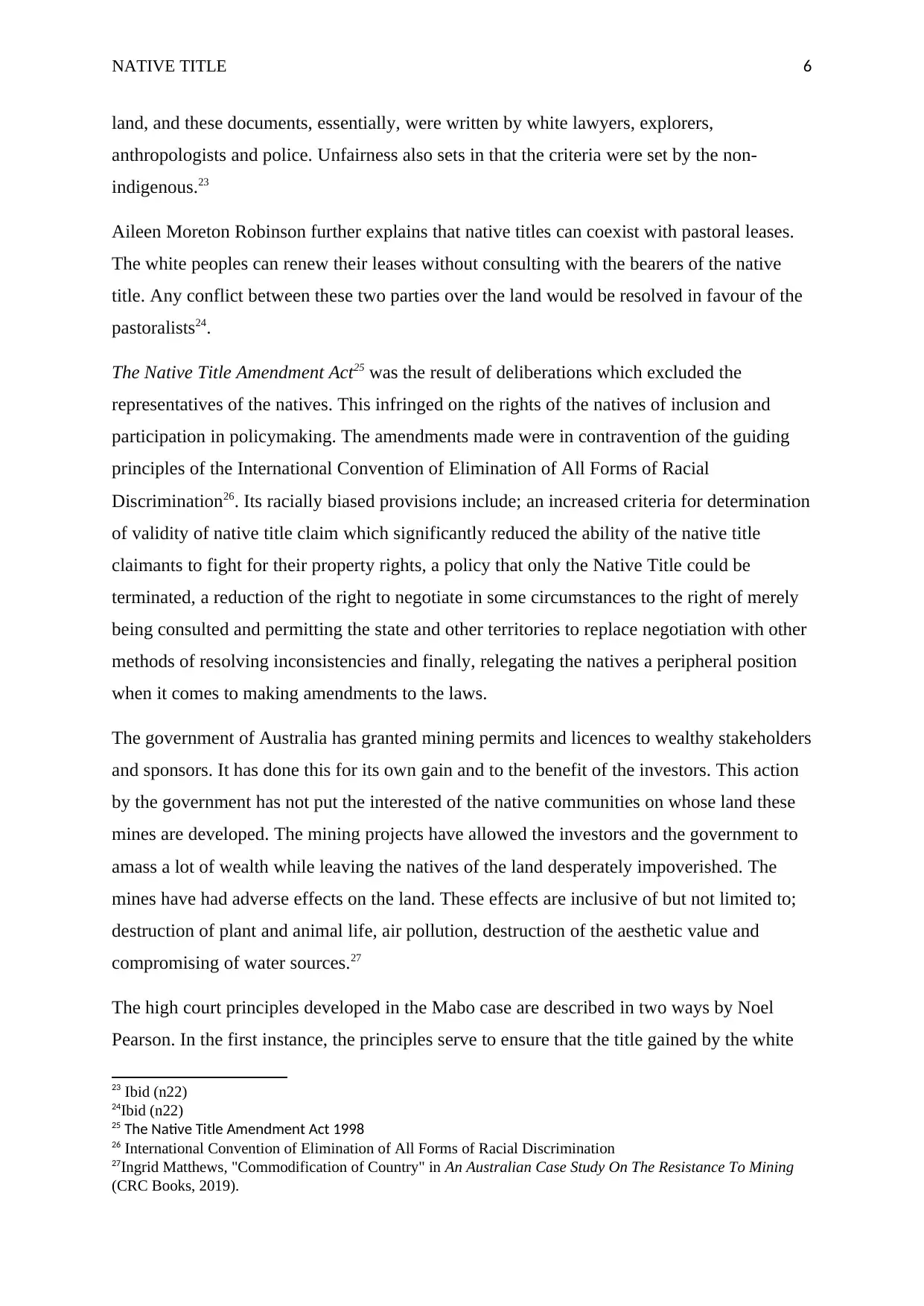
NATIVE TITLE 6
land, and these documents, essentially, were written by white lawyers, explorers,
anthropologists and police. Unfairness also sets in that the criteria were set by the non-
indigenous.23
Aileen Moreton Robinson further explains that native titles can coexist with pastoral leases.
The white peoples can renew their leases without consulting with the bearers of the native
title. Any conflict between these two parties over the land would be resolved in favour of the
pastoralists24.
The Native Title Amendment Act25 was the result of deliberations which excluded the
representatives of the natives. This infringed on the rights of the natives of inclusion and
participation in policymaking. The amendments made were in contravention of the guiding
principles of the International Convention of Elimination of All Forms of Racial
Discrimination26. Its racially biased provisions include; an increased criteria for determination
of validity of native title claim which significantly reduced the ability of the native title
claimants to fight for their property rights, a policy that only the Native Title could be
terminated, a reduction of the right to negotiate in some circumstances to the right of merely
being consulted and permitting the state and other territories to replace negotiation with other
methods of resolving inconsistencies and finally, relegating the natives a peripheral position
when it comes to making amendments to the laws.
The government of Australia has granted mining permits and licences to wealthy stakeholders
and sponsors. It has done this for its own gain and to the benefit of the investors. This action
by the government has not put the interested of the native communities on whose land these
mines are developed. The mining projects have allowed the investors and the government to
amass a lot of wealth while leaving the natives of the land desperately impoverished. The
mines have had adverse effects on the land. These effects are inclusive of but not limited to;
destruction of plant and animal life, air pollution, destruction of the aesthetic value and
compromising of water sources.27
The high court principles developed in the Mabo case are described in two ways by Noel
Pearson. In the first instance, the principles serve to ensure that the title gained by the white
23 Ibid (n22)
24Ibid (n22)
25 The Native Title Amendment Act 1998
26 International Convention of Elimination of All Forms of Racial Discrimination
27Ingrid Matthews, "Commodification of Country" in An Australian Case Study On The Resistance To Mining
(CRC Books, 2019).
land, and these documents, essentially, were written by white lawyers, explorers,
anthropologists and police. Unfairness also sets in that the criteria were set by the non-
indigenous.23
Aileen Moreton Robinson further explains that native titles can coexist with pastoral leases.
The white peoples can renew their leases without consulting with the bearers of the native
title. Any conflict between these two parties over the land would be resolved in favour of the
pastoralists24.
The Native Title Amendment Act25 was the result of deliberations which excluded the
representatives of the natives. This infringed on the rights of the natives of inclusion and
participation in policymaking. The amendments made were in contravention of the guiding
principles of the International Convention of Elimination of All Forms of Racial
Discrimination26. Its racially biased provisions include; an increased criteria for determination
of validity of native title claim which significantly reduced the ability of the native title
claimants to fight for their property rights, a policy that only the Native Title could be
terminated, a reduction of the right to negotiate in some circumstances to the right of merely
being consulted and permitting the state and other territories to replace negotiation with other
methods of resolving inconsistencies and finally, relegating the natives a peripheral position
when it comes to making amendments to the laws.
The government of Australia has granted mining permits and licences to wealthy stakeholders
and sponsors. It has done this for its own gain and to the benefit of the investors. This action
by the government has not put the interested of the native communities on whose land these
mines are developed. The mining projects have allowed the investors and the government to
amass a lot of wealth while leaving the natives of the land desperately impoverished. The
mines have had adverse effects on the land. These effects are inclusive of but not limited to;
destruction of plant and animal life, air pollution, destruction of the aesthetic value and
compromising of water sources.27
The high court principles developed in the Mabo case are described in two ways by Noel
Pearson. In the first instance, the principles serve to ensure that the title gained by the white
23 Ibid (n22)
24Ibid (n22)
25 The Native Title Amendment Act 1998
26 International Convention of Elimination of All Forms of Racial Discrimination
27Ingrid Matthews, "Commodification of Country" in An Australian Case Study On The Resistance To Mining
(CRC Books, 2019).
⊘ This is a preview!⊘
Do you want full access?
Subscribe today to unlock all pages.

Trusted by 1+ million students worldwide
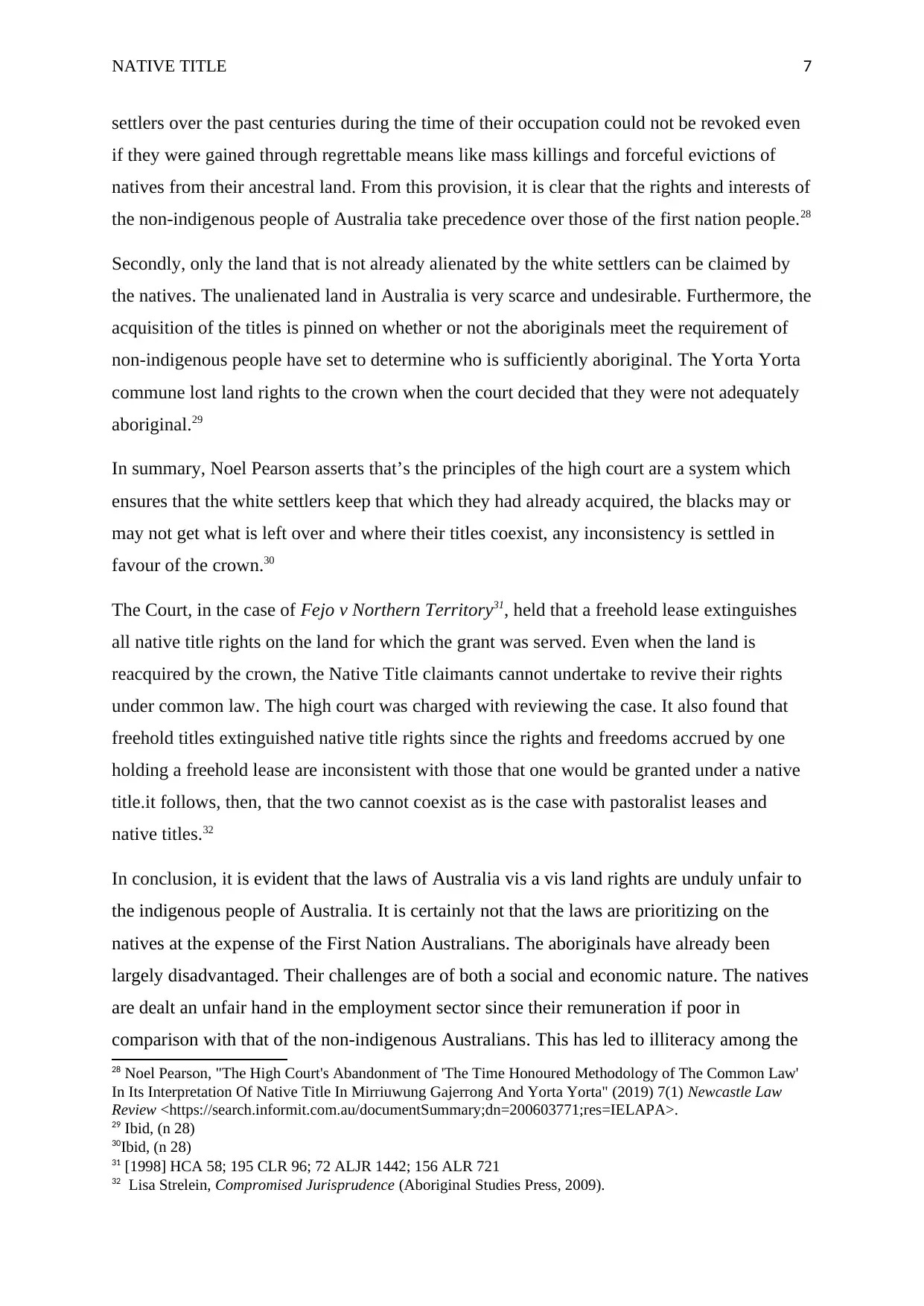
NATIVE TITLE 7
settlers over the past centuries during the time of their occupation could not be revoked even
if they were gained through regrettable means like mass killings and forceful evictions of
natives from their ancestral land. From this provision, it is clear that the rights and interests of
the non-indigenous people of Australia take precedence over those of the first nation people.28
Secondly, only the land that is not already alienated by the white settlers can be claimed by
the natives. The unalienated land in Australia is very scarce and undesirable. Furthermore, the
acquisition of the titles is pinned on whether or not the aboriginals meet the requirement of
non-indigenous people have set to determine who is sufficiently aboriginal. The Yorta Yorta
commune lost land rights to the crown when the court decided that they were not adequately
aboriginal.29
In summary, Noel Pearson asserts that’s the principles of the high court are a system which
ensures that the white settlers keep that which they had already acquired, the blacks may or
may not get what is left over and where their titles coexist, any inconsistency is settled in
favour of the crown.30
The Court, in the case of Fejo v Northern Territory31, held that a freehold lease extinguishes
all native title rights on the land for which the grant was served. Even when the land is
reacquired by the crown, the Native Title claimants cannot undertake to revive their rights
under common law. The high court was charged with reviewing the case. It also found that
freehold titles extinguished native title rights since the rights and freedoms accrued by one
holding a freehold lease are inconsistent with those that one would be granted under a native
title.it follows, then, that the two cannot coexist as is the case with pastoralist leases and
native titles.32
In conclusion, it is evident that the laws of Australia vis a vis land rights are unduly unfair to
the indigenous people of Australia. It is certainly not that the laws are prioritizing on the
natives at the expense of the First Nation Australians. The aboriginals have already been
largely disadvantaged. Their challenges are of both a social and economic nature. The natives
are dealt an unfair hand in the employment sector since their remuneration if poor in
comparison with that of the non-indigenous Australians. This has led to illiteracy among the
28 Noel Pearson, "The High Court's Abandonment of 'The Time Honoured Methodology of The Common Law'
In Its Interpretation Of Native Title In Mirriuwung Gajerrong And Yorta Yorta" (2019) 7(1) Newcastle Law
Review <https://search.informit.com.au/documentSummary;dn=200603771;res=IELAPA>.
29 Ibid, (n 28)
30Ibid, (n 28)
31 [1998] HCA 58; 195 CLR 96; 72 ALJR 1442; 156 ALR 721
32 Lisa Strelein, Compromised Jurisprudence (Aboriginal Studies Press, 2009).
settlers over the past centuries during the time of their occupation could not be revoked even
if they were gained through regrettable means like mass killings and forceful evictions of
natives from their ancestral land. From this provision, it is clear that the rights and interests of
the non-indigenous people of Australia take precedence over those of the first nation people.28
Secondly, only the land that is not already alienated by the white settlers can be claimed by
the natives. The unalienated land in Australia is very scarce and undesirable. Furthermore, the
acquisition of the titles is pinned on whether or not the aboriginals meet the requirement of
non-indigenous people have set to determine who is sufficiently aboriginal. The Yorta Yorta
commune lost land rights to the crown when the court decided that they were not adequately
aboriginal.29
In summary, Noel Pearson asserts that’s the principles of the high court are a system which
ensures that the white settlers keep that which they had already acquired, the blacks may or
may not get what is left over and where their titles coexist, any inconsistency is settled in
favour of the crown.30
The Court, in the case of Fejo v Northern Territory31, held that a freehold lease extinguishes
all native title rights on the land for which the grant was served. Even when the land is
reacquired by the crown, the Native Title claimants cannot undertake to revive their rights
under common law. The high court was charged with reviewing the case. It also found that
freehold titles extinguished native title rights since the rights and freedoms accrued by one
holding a freehold lease are inconsistent with those that one would be granted under a native
title.it follows, then, that the two cannot coexist as is the case with pastoralist leases and
native titles.32
In conclusion, it is evident that the laws of Australia vis a vis land rights are unduly unfair to
the indigenous people of Australia. It is certainly not that the laws are prioritizing on the
natives at the expense of the First Nation Australians. The aboriginals have already been
largely disadvantaged. Their challenges are of both a social and economic nature. The natives
are dealt an unfair hand in the employment sector since their remuneration if poor in
comparison with that of the non-indigenous Australians. This has led to illiteracy among the
28 Noel Pearson, "The High Court's Abandonment of 'The Time Honoured Methodology of The Common Law'
In Its Interpretation Of Native Title In Mirriuwung Gajerrong And Yorta Yorta" (2019) 7(1) Newcastle Law
Review <https://search.informit.com.au/documentSummary;dn=200603771;res=IELAPA>.
29 Ibid, (n 28)
30Ibid, (n 28)
31 [1998] HCA 58; 195 CLR 96; 72 ALJR 1442; 156 ALR 721
32 Lisa Strelein, Compromised Jurisprudence (Aboriginal Studies Press, 2009).
Paraphrase This Document
Need a fresh take? Get an instant paraphrase of this document with our AI Paraphraser
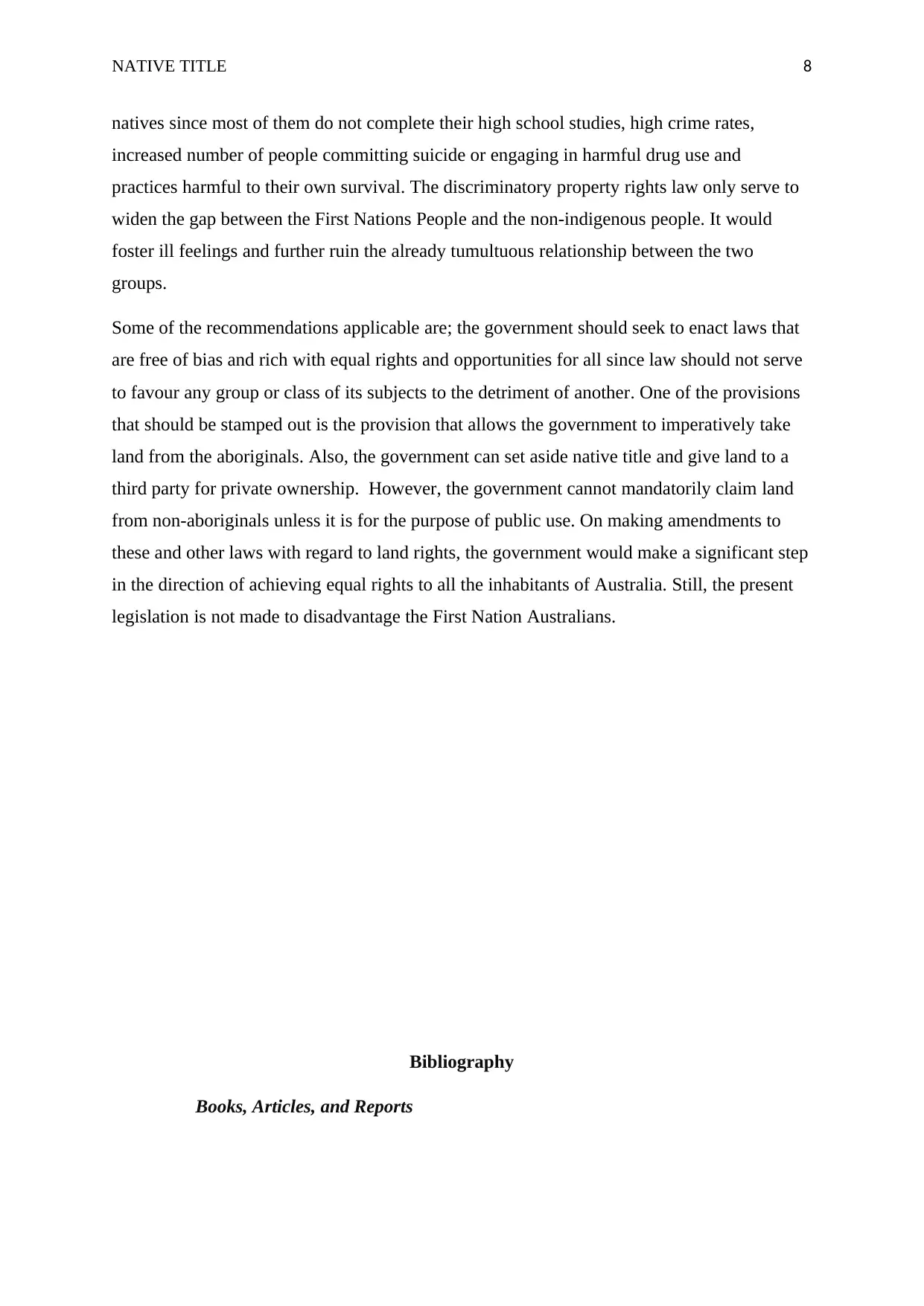
NATIVE TITLE 8
natives since most of them do not complete their high school studies, high crime rates,
increased number of people committing suicide or engaging in harmful drug use and
practices harmful to their own survival. The discriminatory property rights law only serve to
widen the gap between the First Nations People and the non-indigenous people. It would
foster ill feelings and further ruin the already tumultuous relationship between the two
groups.
Some of the recommendations applicable are; the government should seek to enact laws that
are free of bias and rich with equal rights and opportunities for all since law should not serve
to favour any group or class of its subjects to the detriment of another. One of the provisions
that should be stamped out is the provision that allows the government to imperatively take
land from the aboriginals. Also, the government can set aside native title and give land to a
third party for private ownership. However, the government cannot mandatorily claim land
from non-aboriginals unless it is for the purpose of public use. On making amendments to
these and other laws with regard to land rights, the government would make a significant step
in the direction of achieving equal rights to all the inhabitants of Australia. Still, the present
legislation is not made to disadvantage the First Nation Australians.
Bibliography
Books, Articles, and Reports
natives since most of them do not complete their high school studies, high crime rates,
increased number of people committing suicide or engaging in harmful drug use and
practices harmful to their own survival. The discriminatory property rights law only serve to
widen the gap between the First Nations People and the non-indigenous people. It would
foster ill feelings and further ruin the already tumultuous relationship between the two
groups.
Some of the recommendations applicable are; the government should seek to enact laws that
are free of bias and rich with equal rights and opportunities for all since law should not serve
to favour any group or class of its subjects to the detriment of another. One of the provisions
that should be stamped out is the provision that allows the government to imperatively take
land from the aboriginals. Also, the government can set aside native title and give land to a
third party for private ownership. However, the government cannot mandatorily claim land
from non-aboriginals unless it is for the purpose of public use. On making amendments to
these and other laws with regard to land rights, the government would make a significant step
in the direction of achieving equal rights to all the inhabitants of Australia. Still, the present
legislation is not made to disadvantage the First Nation Australians.
Bibliography
Books, Articles, and Reports
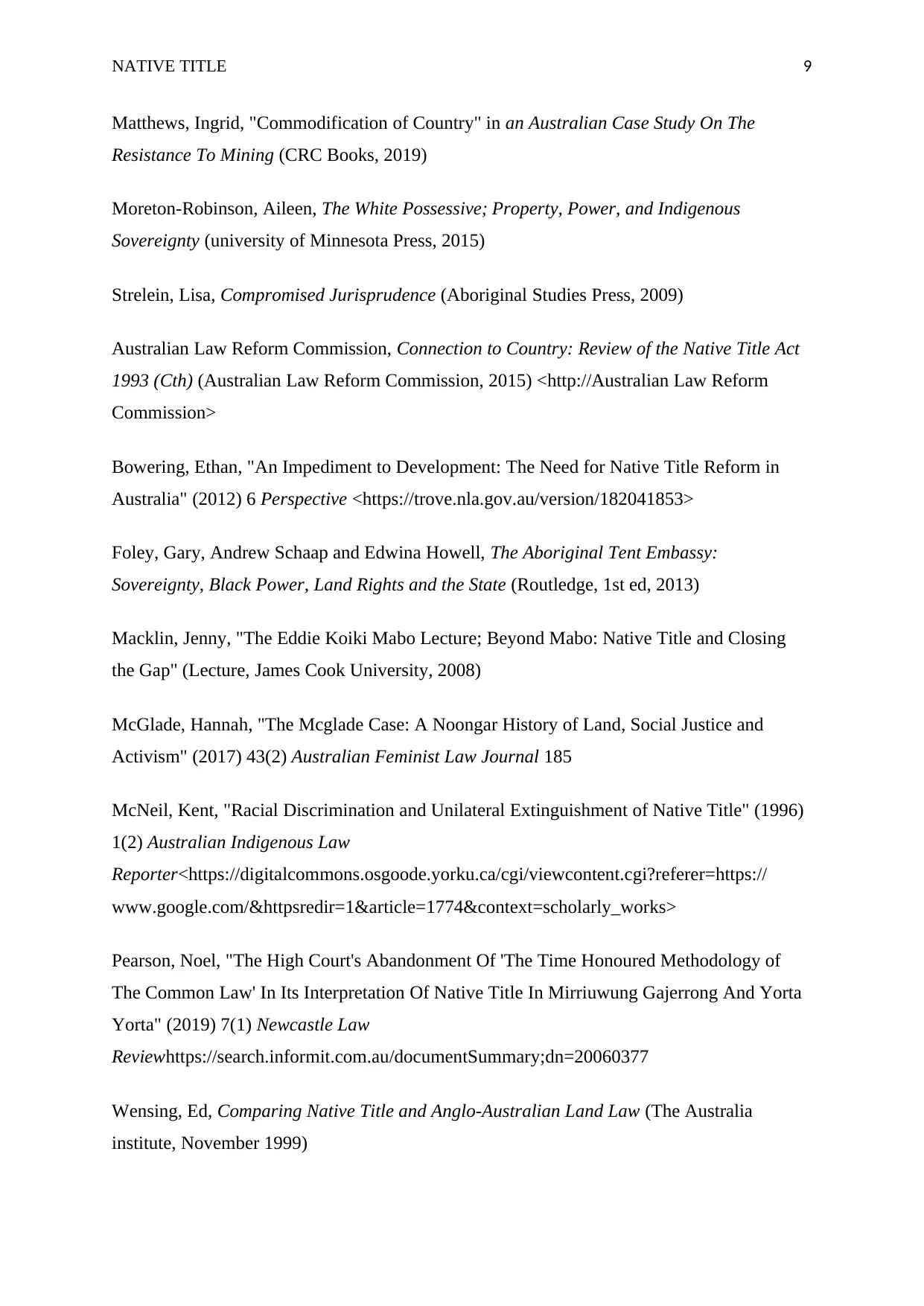
NATIVE TITLE 9
Matthews, Ingrid, "Commodification of Country" in an Australian Case Study On The
Resistance To Mining (CRC Books, 2019)
Moreton-Robinson, Aileen, The White Possessive; Property, Power, and Indigenous
Sovereignty (university of Minnesota Press, 2015)
Strelein, Lisa, Compromised Jurisprudence (Aboriginal Studies Press, 2009)
Australian Law Reform Commission, Connection to Country: Review of the Native Title Act
1993 (Cth) (Australian Law Reform Commission, 2015) <http://Australian Law Reform
Commission>
Bowering, Ethan, "An Impediment to Development: The Need for Native Title Reform in
Australia" (2012) 6 Perspective <https://trove.nla.gov.au/version/182041853>
Foley, Gary, Andrew Schaap and Edwina Howell, The Aboriginal Tent Embassy:
Sovereignty, Black Power, Land Rights and the State (Routledge, 1st ed, 2013)
Macklin, Jenny, "The Eddie Koiki Mabo Lecture; Beyond Mabo: Native Title and Closing
the Gap" (Lecture, James Cook University, 2008)
McGlade, Hannah, "The Mcglade Case: A Noongar History of Land, Social Justice and
Activism" (2017) 43(2) Australian Feminist Law Journal 185
McNeil, Kent, "Racial Discrimination and Unilateral Extinguishment of Native Title" (1996)
1(2) Australian Indigenous Law
Reporter<https://digitalcommons.osgoode.yorku.ca/cgi/viewcontent.cgi?referer=https://
www.google.com/&httpsredir=1&article=1774&context=scholarly_works>
Pearson, Noel, "The High Court's Abandonment Of 'The Time Honoured Methodology of
The Common Law' In Its Interpretation Of Native Title In Mirriuwung Gajerrong And Yorta
Yorta" (2019) 7(1) Newcastle Law
Reviewhttps://search.informit.com.au/documentSummary;dn=20060377
Wensing, Ed, Comparing Native Title and Anglo-Australian Land Law (The Australia
institute, November 1999)
Matthews, Ingrid, "Commodification of Country" in an Australian Case Study On The
Resistance To Mining (CRC Books, 2019)
Moreton-Robinson, Aileen, The White Possessive; Property, Power, and Indigenous
Sovereignty (university of Minnesota Press, 2015)
Strelein, Lisa, Compromised Jurisprudence (Aboriginal Studies Press, 2009)
Australian Law Reform Commission, Connection to Country: Review of the Native Title Act
1993 (Cth) (Australian Law Reform Commission, 2015) <http://Australian Law Reform
Commission>
Bowering, Ethan, "An Impediment to Development: The Need for Native Title Reform in
Australia" (2012) 6 Perspective <https://trove.nla.gov.au/version/182041853>
Foley, Gary, Andrew Schaap and Edwina Howell, The Aboriginal Tent Embassy:
Sovereignty, Black Power, Land Rights and the State (Routledge, 1st ed, 2013)
Macklin, Jenny, "The Eddie Koiki Mabo Lecture; Beyond Mabo: Native Title and Closing
the Gap" (Lecture, James Cook University, 2008)
McGlade, Hannah, "The Mcglade Case: A Noongar History of Land, Social Justice and
Activism" (2017) 43(2) Australian Feminist Law Journal 185
McNeil, Kent, "Racial Discrimination and Unilateral Extinguishment of Native Title" (1996)
1(2) Australian Indigenous Law
Reporter<https://digitalcommons.osgoode.yorku.ca/cgi/viewcontent.cgi?referer=https://
www.google.com/&httpsredir=1&article=1774&context=scholarly_works>
Pearson, Noel, "The High Court's Abandonment Of 'The Time Honoured Methodology of
The Common Law' In Its Interpretation Of Native Title In Mirriuwung Gajerrong And Yorta
Yorta" (2019) 7(1) Newcastle Law
Reviewhttps://search.informit.com.au/documentSummary;dn=20060377
Wensing, Ed, Comparing Native Title and Anglo-Australian Land Law (The Australia
institute, November 1999)
⊘ This is a preview!⊘
Do you want full access?
Subscribe today to unlock all pages.

Trusted by 1+ million students worldwide
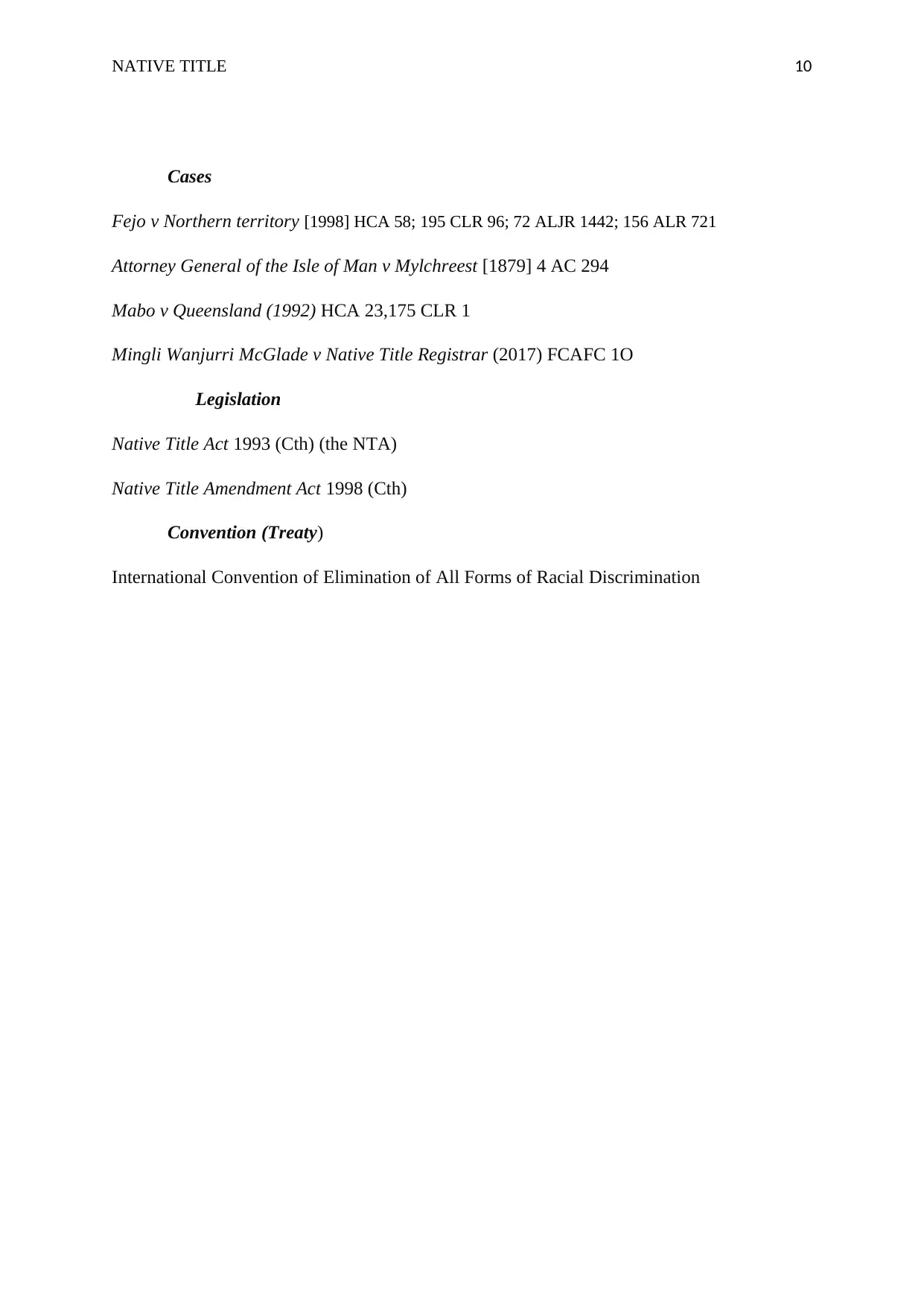
NATIVE TITLE 10
Cases
Fejo v Northern territory [1998] HCA 58; 195 CLR 96; 72 ALJR 1442; 156 ALR 721
Attorney General of the Isle of Man v Mylchreest [1879] 4 AC 294
Mabo v Queensland (1992) HCA 23,175 CLR 1
Mingli Wanjurri McGlade v Native Title Registrar (2017) FCAFC 1O
Legislation
Native Title Act 1993 (Cth) (the NTA)
Native Title Amendment Act 1998 (Cth)
Convention (Treaty)
International Convention of Elimination of All Forms of Racial Discrimination
Cases
Fejo v Northern territory [1998] HCA 58; 195 CLR 96; 72 ALJR 1442; 156 ALR 721
Attorney General of the Isle of Man v Mylchreest [1879] 4 AC 294
Mabo v Queensland (1992) HCA 23,175 CLR 1
Mingli Wanjurri McGlade v Native Title Registrar (2017) FCAFC 1O
Legislation
Native Title Act 1993 (Cth) (the NTA)
Native Title Amendment Act 1998 (Cth)
Convention (Treaty)
International Convention of Elimination of All Forms of Racial Discrimination
1 out of 10
Related Documents
Your All-in-One AI-Powered Toolkit for Academic Success.
+13062052269
info@desklib.com
Available 24*7 on WhatsApp / Email
![[object Object]](/_next/static/media/star-bottom.7253800d.svg)
Unlock your academic potential
Copyright © 2020–2026 A2Z Services. All Rights Reserved. Developed and managed by ZUCOL.

![Mabo Case [No.2]: Analyzing Impact on Australian Legal System](/_next/image/?url=https%3A%2F%2Fdesklib.com%2Fmedia%2Fmabo-case-impact-australian-legal-system_page_2.jpg&w=256&q=75)



